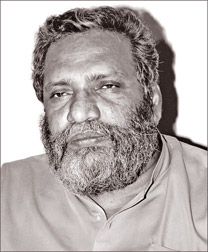‘Accessibility at voting’ for less-abled persons
Dr. Ajith C. S. Perera
|

Elections Commissioner Mahinda Deshapriya |
Every person who qualifies to be an elector and be in the register of
electors, irrespective of the degree of his/her mobility, eye-sight and
hearing, has a right and also is eligible to vote at the elections.
We warmly appreciate the continuing endeavours of Commissioner of
Elections Mahinda Deshapriya and his dedicated staff to improve physical
access to voting and thereby enabling all persons to cast their votes in
a free and fair manner.
Yet, people with restricted ability often face considerable barriers
to reaching the ballot box - metaphorically and physically.
I am aware of many people who very much had the desire to go and cast
their valuable vote but have been reluctantly compelled to refrain from
exercising this fundamental right due to ‘red tape’ involved in getting
prior approvals as well as overcoming the hindrances of safety hazards
and/or physical barriers either in approaching their polling stations
and/ or accessing their polling booths, even if accompanied by a helper.
 Although at most places the staff on election duty are quite helpful
with understanding, in many districts casting their vote could become
the crucial deciding factor. Although at most places the staff on election duty are quite helpful
with understanding, in many districts casting their vote could become
the crucial deciding factor.
Open your eyes
With the emergence of the Social Model of disability, world views and
perceptions on what it means to be ‘dis-Abled’ have changed rapidly -
and for the better - to enhance the quality of life of ALL people.
It recognised that every one of us, irrespective of our positions and
possessions, is only ‘temporary able-bodied’ and only to varying
degrees, and that too keeps on changing.
Every country is made up of people with limitations in ability,
physically, sensorily and intellectually, to varying degrees. Every one
of us, for different reasons, is certain to spend some of our time
living with abilities restricted, in getting around (moving and seeing),
physical coordination, manual dexterity and ability to concentrate,
learn or understand. Sri Lanka has more pregnant mothers, those
convalescing and living with numerous debilitating medical conditions
(that often go unnoticed), elders carrying small children who are also
thus physically restricted in their movement.
Hence, inaccessibility of polling stations is an important issue.
The Elections Commissioner is the independent watchdog that makes
sure that everyone who is eligible to vote gets hindrance-free equal
opportunity to do so.
The way a country treats this ‘dis-Abled’ population or rather, its
‘ability restricted’ people and the true extent to which they are
respected as fully-fledged citizens is a realistic, internationally
recognized, measure of a country’s good governance and a far more
telling indicator of society’s development than GDP.
A costly miss by politicians
Sri Lanka has the fastest ageing population in our region with almost
17 percent of the population soon being over 65.
An estimated 20 percent of Sri Lanka’s VOTING POPULATION i.e. four
million have diverse ability; unable to move freely and are often forced
silently to fight an uphill battle for safety, access and accommodation,
even at public buildings and facilities.
These facts were accepted and recognised by the Supreme Court when
orders were issued on April 28, 2011 under SC (FR) 221 / 2009 making
compliance mandatory with design standards and laws in constructing ALL
parts of NEW public buildings and facilities.
Is my polling place accessible?
This article has been written with utmost good faith, to create the
awareness amongst decision makers, of this prevalent physical problem
faced at previous elections by an ever increasing sector of our
population that perhaps had also contributed a drop in the percentage
who actually voted.
Furthermore, this writer had earlier taken the initiative in
compiling a simple check-list as a guideline and forwarded it to the
people concerned with the sincere belief that it would help them
promptly to identify in advance, through a very simple self-audit,
potential physical barriers to access at polling stations and thereafter
how easily to eliminate most of them, in the larger interest of a ‘free
and fair enabling election’ for the dis-Abled people.
This we appreciate very much and believe it is a step closer towards
a more meaningful ‘Social inclusion equally for all’.
However, it is essential to create wide awareness about the
procedures established to minimize the ‘red tape’ in getting prior
approvals by the less able voters and enabling facilities in place at
polling stations to ensure greater accessibility that should encourage
disadvantaged voters to cast their votes FREE of physical hindrances and
any discrimination.
A clearly spelt out communiqu‚ from the election commissioner in
print and electronic media, covering both these vital aspects, is the
best way to achieve this.
(The writer, Secretary-General of ‘IDIRIYA’, is a voluntary
disability rights activist and a known advisor on accessibility) |



